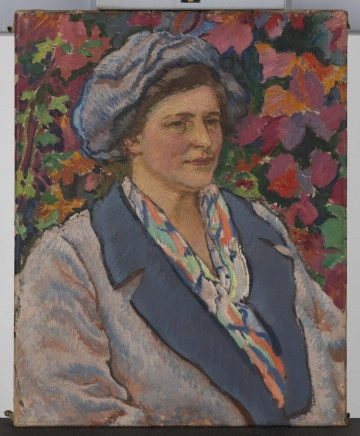
Portrait of the wife
National Museum in Lublin
Part of the collection: European classics of modernity
Józef Chełmoński is a representative of Polish realism, best known for his depictions of the Polish countryside. Between 1867 and 1871, he attended the Warsaw Drawing Class and Wojciech Gerson's private studio. In 1872, he studied at the Royal-Bavarian Academy of Fine Arts in Munich under Hermann Anschütz and Alexander Strähuber. On returning to Warsaw (1874), he shared with Witkiewicz and Chmielowski the studio rented in the building of the European Hotel. In 1872 and 1874-1875, he made several trips to Podolia and Ukraine. Then, he became fascinated by the realities of the countryside, which became the focus of his paintings. Chełmoński's realism was distinguished by depicting rural scenery in a natural, accidental and dynamic arrangement, as a record of the commonness of everyday life, reflecting a whole gallery of actual personality types. He introduced scenes and characters into Polish art, which artists did not depict due to their low social and aesthetic status. His vision of art did not initially meet with a favourable reception. He left for Paris in 1875 and achieved artistic success there. During his Parisian period, he became fascinated with the problems of landscape painting. A breakthrough in his work (and life) came in 1886-1887 after returning to Poland. Chełmoński bought a small manor house in Kuklówka near Grodzisk Mazowiecki, where he worked and farmed. From that moment on, he painted almost exclusively landscapes emanating metaphysical longing. At that time, he gained widespread recognition in Poland thanks to his virtuosity in rendering shapes and forms and keen observation of nature. Zjazd przed karczmą [The Meeting in front of an Inn] was painted in 1877 during the Paris period. It is a sketch for a painting and, therefore, it is not a rigorously realistic picture, with a centrally placed figure, typical of the artist.
Beata Małgorzata Wolska
Author / creator
Dimensions
cały obiekt: height: 58,5 cm, width: 104 cm
Object type
painting
Creation time / dating
Creation / finding place
Identification number
Location / status